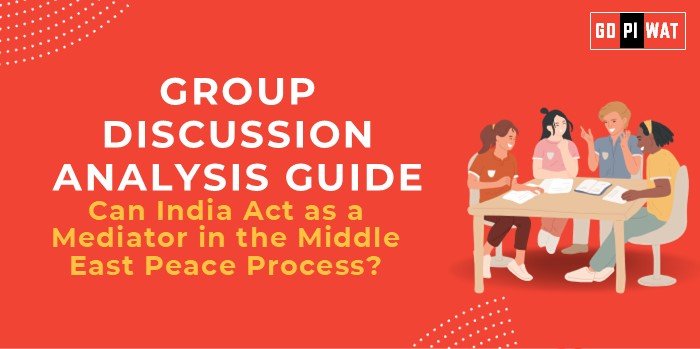📋 Group Discussion Analysis Guide
🌟 Can India Act as a Mediator in the Middle East Peace Process?
🌐 Introduction to the Topic
Opening Context: India has long maintained diplomatic ties with both Israel and Palestine, as well as other key Middle Eastern nations, earning a reputation for neutrality and non-alignment. With its growing geopolitical clout and balancing act between global superpowers, India is increasingly seen as a potential mediator in one of the world’s most protracted conflicts.
Topic Background: The Middle East peace process, involving the resolution of the Israel-Palestine conflict and related regional disputes, has eluded concrete resolution for decades. India’s historical stance of supporting Palestinian self-determination alongside its burgeoning relations with Israel underscores its nuanced position.
📊 Quick Facts and Key Statistics
- ⛽ India’s Oil Dependency: 60% of India’s crude imports are from the Middle East, underlining India’s stakes in regional stability.
- 🕊️ UN Peacekeeping Contributions: India has been among the largest contributors to UN peacekeeping missions in the Middle East.
- 💼 Trade Ties: India-Middle East trade exceeds $160 billion annually, highlighting strong economic interdependence.
- 🌍 Diaspora Influence: Over 9 million Indians live in the Gulf region, making regional peace crucial for India’s expatriates.
🤝 Stakeholders and Their Roles
- 🇮🇳 India: Potential neutral mediator due to balanced ties with Israel, Palestine, and other Middle Eastern nations.
- 🇮🇱🇵🇸 Israel & Palestine: Central parties with deep-rooted territorial and political disputes.
- 🏢 Middle Eastern Nations: Gulf countries like Saudi Arabia and UAE have a vested interest in regional stability and growing ties with Israel.
- 🌐 Global Players: The US, Russia, and EU have historically mediated but face credibility challenges.
🏆 Achievements and Challenges
🌟 Achievements:
- Diplomatic Balance: India has avoided overt bias, maintaining relations with both Israel and Palestine.
- Defense and Trade Collaborations: Strengthened ties with Israel in defense and technology sectors.
- Global Advocacy: Consistent support for Palestinian statehood in international forums.
⚠️ Challenges:
- Balancing Relations: Managing ties with the US and Middle Eastern nations in a polarized environment.
- Limited Historical Involvement: Lack of direct mediation experience in the Middle East peace process.
- Potential Risks: Alienating key trade and defense partners through perceived partiality.
🌍 Global Comparisons
- 🇹🇷 Turkey: Active mediation efforts in 2022 showcased regional leadership potential but faced opposition.
- 🇳🇴 Norway: Played a pivotal role in the Oslo Accords, demonstrating the effectiveness of small-state diplomacy.
Case Study: The Abraham Accords (2020): India’s engagement with UAE and Israel aligns with this framework of fostering regional peace.
📄 Structured Arguments for Discussion
- ✅ Supporting Stance: “India’s neutrality, strategic ties, and non-aligned history uniquely position it as a credible mediator.”
- ❌ Opposing Stance: “India lacks historical experience in mediation and faces domestic constraints that limit its role.”
- ⚖️ Balanced Perspective: “While India’s neutrality offers promise, its success as a mediator depends on aligning with international frameworks and gaining regional trust.”
🗣️ Effective Discussion Approaches
- 📜 Opening Approaches:
- Highlight India’s diplomatic balance between Israel and Palestine.
- Emphasize India’s economic and diaspora stakes in regional stability.
- 🎯 Counter-Argument Handling:
- “India’s limited experience is a hurdle, but its growing influence in the G20 and BRICS provides a foundation for credibility.”
- “India’s energy and trade ties with the Middle East ensure its vested interest in a peaceful resolution.”
🔍 Strategic Analysis of Strengths and Weaknesses
- 📈 Strengths: Neutrality, growing geopolitical influence, strong economic ties.
- ⚠️ Weaknesses: Limited mediation experience, risks of domestic backlash.
- 🌟 Opportunities: Collaboration with global powers, leveraging diaspora influence.
- ⚡ Threats: Escalating tensions in the region, opposition from established mediators.
🎓 Connecting with B-School Applications
- 🌍 Real-World Applications: Mediating international conflicts aligns with leadership and negotiation themes in management education.
- 💡 Sample Interview Questions:
- “How can India’s trade relations impact its role in the Middle East peace process?”
- “What lessons from corporate conflict resolution apply to international mediation?”
- ✨ Insights for Students:
- Negotiation skills are critical for resolving multi-stakeholder conflicts.
- Understanding geopolitical strategies can aid in global market entry and leadership roles.


